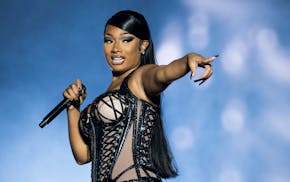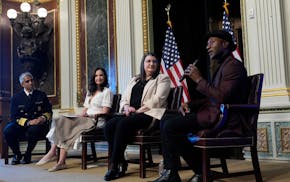GENERAL TENDENCIES
• Men stay in their comfort zones; women are more adventurous.
• Women shop for communal gatherings, men for themselves.
• Men are geared toward impressing, women toward pleasing.
• Women buy wine for the short term (sharing), men for the long term (hoarding).
• Men buy on the basis of testimonials from experts, women on tips from friends and merchants.
• Women order wine by the glass at restaurants; men order bottles.
It started back in, well, the Garden of Eden.
In the beginning, it was Eve, inquisitive and experimental, who first sampled a "forbidden" fruit. And once she gave it history's first 90-point rating, the pedigree-oriented Adam just had to have some for himself.
Then and there, the lines of demarcation between the two genders' approaches to fruit products began to be drawn. They exist to this day.
"Men approach wine more analytically and women more holistically," said Natalie MacLean, wine-book author and purveyor of the website www.nataliemaclean.com. "Men are far more focused on the scores and women on the stories behind the wines."
The differences come into stark view at wine stores, where "shelf talkers," those slips of paper touting the wines, fall into two distinct categories: critics' scores vs. food-pairing and experiential notes.
"Men will come in and say 'I was reading about this wine in the Wine Spectator or Robert Parker,'" said Kristen Kowalski, owner of the Wine Market stores in Mendota Heights and Woodbury. "Women will want something they've seen on the Food Network, paired with a recipe. Or they'll ask for something they had on vacation, or at a restaurant.
"Women want to buy a wine that everybody likes. They will be more drawn to my shelf talker that says 'perfect for a book club.'"
These tendencies are especially prevalent in the way men and women shop for wine in a store or order it in a restaurant. Even though they have been proven to have better palates than men, women are much more likely to seek help when selecting wine, while guys ... well, we all know how they are about asking for directions.
Men also are more prone to act as though they know more about wine than they really do. A recent British study found that 22 percent of men embellish their expertise to impress peers in restaurants. "Wine is like sex," the wine writer Hugh Johnson has famously noted, "in that few men will admit not knowing all about it."
Men are from Napa. Women are from Italy.
It's not as though the wine world is vastly different from other fields. In much the same way that most self-described "Star Trek" geeks and fantasy-football geeks are men who love to immerse themselves in a topic and learn every arcane detail about it, most wine geeks are of the male persuasion.
They feed their hunting-and-gathering instincts by boning up on vintage and ratings charts. Once honed in, they tend not to stray far from their targets, experts say.
"Men seem to find a comfort zone and stay in it," said Kowalski. "They'll say something like 'I drink California cabernet, I always have, I can read the label and understand it, that's what I want.' They tend to be intimidated about venturing into other countries, where they don't understand the labels."
Within that comfort zone, though, men tend to think quantity as well as quality. Although women purchase most of the wine in this country (57 percent in 2006, according to the Adams Wine Handbook), men are more predisposed toward stocking up.
"If there's a particular wine or vintage that they like, men have a slightly stronger instinct to purchase a case of that wine," said France 44 vice president and partner David Anderson. "Women will purchase wine by the case, but it will be assorted wines, half red and half white, or 12 different bottles."
Meanwhile, the knowledge gap is dwindling. Wine classes at Surdyk's and France 44 are split down the middle gender-wise, store officials say. More books are describing and contextualizing wine in nontraditional fashion, including MacLean's "Red, White and Drunk All Over" and Leslie Sbrocco's "Wine for Women."
"It's time to quit talking about wine in terms that nobody can understand," said Sbrocco. "That's why I talk about wines as fabrics -- a great merlot is like drinking cashmere or riesling is like a spring dress -- or as people, like 'This wine is Gérard Depardieu, thick and brooding.'
"It's all about finding a way to communicate with people in a way that makes sense to them. And if numbers make sense to men and wardrobe references make sense for women, that's fine. There is no wrong in wine."
What's in a label? A lot
At the professional level, women have burst through the Riedel-glass ceiling in this longtime bastion of old-boy clubbiness -- as winery owners, winemakers and tastemakers. But the gap between how the genders purchase and consume wine has narrowed little, prompting a lot of marketing directed at women during the last decade. Most notable was a spate of Australian wines with cuddly animals on the labels. U.S. sales of these "critter wines" (led by Yellow Tail and its kangaroo) topped $600 million in 2006, according to A.C. Nielsen.
"Labels sell, let's be honest," said Sara Craft, a rep for local distributor Paustis. "And there are some great labels out there. But I think the furry critter has seen its day, knock on wood."
Others agreed that "critter labels" are on the wane, and that more sophisticated marketing -- stressing the experience of a girlfriends' night out, for example -- has emerged.
But that hardly means that gimmicks, which skirt the line between empowering and patronizing, are going away. Industry giant Beringer is proffering a low-cal chardonnay called White Lie. Local chain Haskell's has an exclusive agreement to carry a French brand dubbed Lulu B. The marketing taglines for "Mad Housewife" wines include "Award thyself" and "The dishes can wait. Dinner be damned." And don't get Kowalski started on the brand Mommy's Time Out.
Meanwhile, those plucky Aussies are back with a new twist, said France 44's Anderson: "Now you see them with wines called Bitch! and Evil. You put them side by side and it says 'Evil Bitch!'"
Again, it's not as though the wine biz has a markedly different marketing approach from other industries.
"I have no problem whatsoever with marketing to women on wine," said Sbrocco. "They do it with shoes, clothes, computers. They market everything to younger people, or African-Americans. Are women and men ever going to buy computers the same way, or cars, or travel packages? No. We are hard-wired differently.
"The point is getting people to understand and appreciate wine and making it fun, as opposed to some old guy with his pinky in the air. It is fermented grape juice, after all."
Bill Ward • 612-673-7643

Photographer alleges he was forced to watch Megan Thee Stallion have sex and was unfairly fired
Phish fans are famously dedicated. What happens when they enter the Sphere?
Minneapolis will bid to host Sundance Film Festival

Icehouse on Eat Street in Mpls. facing eviction for unpaid rent
